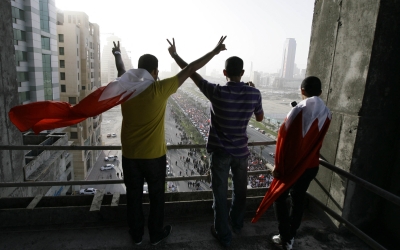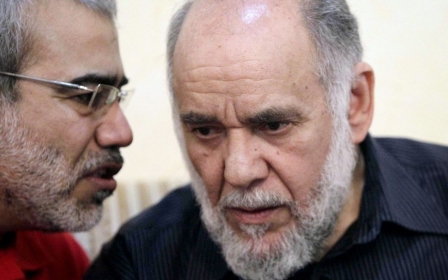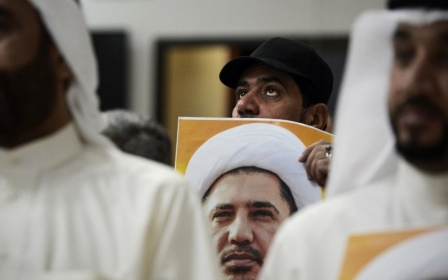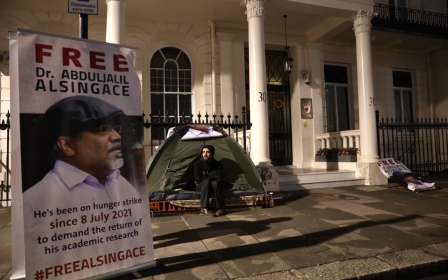Bahrain paid over £20k to bring British MPs to Manama Dialogue, records show
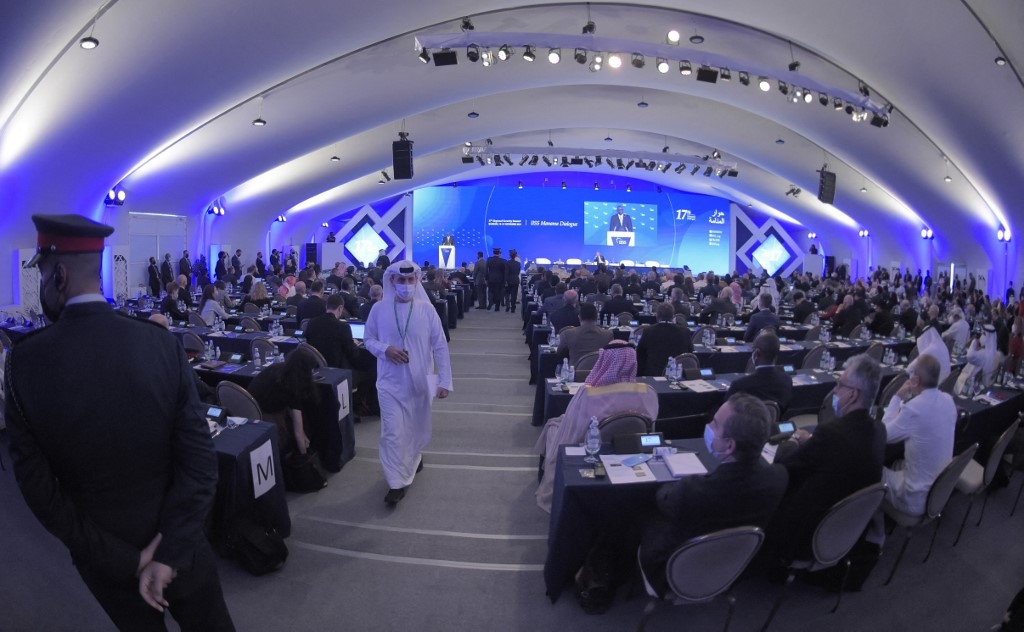
Bahrain paid over £20,000 to bring four British MPs to the Manama Dialogue held in the kingdom in late November, records filed with the parliamentary register of interests show.
Tory MPs Tobias Ellwood, Bob Seely, Royston Smith and Bob Stewart were each paid £5,349 by the kingdom's foreign ministry for their flights, accommodation and meals during the five-day visit.
New MEE newsletter: Jerusalem Dispatch
Sign up to get the latest insights and analysis on Israel-Palestine, alongside Turkey Unpacked and other MEE newsletters
During their trip to the annual conference organised by the International Institute for Strategic Studies, a British delegation met with Bahrain's interior minister, who was accused last year by 24 British MPs of playing a "protracted role in overseeing a culture of abuse and a climate of impunity in Bahrain".
Elwood, a former Middle East and North Africa minister, also met with Sheikh Khalid bin Ahmed bin Mohammed Al Khalifa, a foreign affairs adviser to King Hamad bin Isa Al Khalifa.
According to Bahrain's state-run media agency, Sheikh Khalid told Ellwood that he appreciated "the UK’s role in supporting efforts to enhance security and stability in the region".
MPs who responded to Middle East Eye's questions defended the trip, organised by the Conservative Middle East Council (CMEC), saying it was an opportunity to meet influential delegates from across the globe who were focused on international defence and security.
In an interview recorded in Manama, Ellwood agreed with CMEC's director, Charlotte Leslie, that it was especially important to meet in person after the Covid-19 pandemic lockdowns and also following the US and UK withdrawal from Afghanistan.
"I've been able to catch up and relate and share ideas and also represent Britain, if you like - a small 'r' representing - to explain to [participants] what is going on with British politics and our commitment," Ellwood said. "We have the reach, perhaps the trust, the engagement, the history to help shape the world to become a better place. We need to continue to do that."
Several Bahraini activists, however, say they believe that by accepting hospitality, the MPs have made it difficult to raise human rights concerns with Bahrain's authorities and will now feel compelled to speak positively about the kingdom in public. And it's a trend they say they've witnessed among British MPs for several years.
'Laced with blood'
Ala'a Shehabi, an academic at University College London and joint editor of Bahrain's Uprising: Resistance and Repression in the Gulf, said that MPs lobbying for "dodgy states and corporations" in return for payments and hospitality has brought "British democracy into disrepute".
"Some of these MPs even go as far as questioning the findings of reputable human rights activists and organisations, ignoring hundreds of documented cases of extrajudicial killing and torture to make the case in parliament that Bahrain’s judicial system is ‘quite fair’," she told MEE.
"These first-class plane tickets and five-star hotels are laced with the blood of those fighting for democracy and self-determination in their country, while these MPs obstruct progress and the struggle for real reform."
'It is absolutely shameful to see MPs accepting money in the form of hospitality from abusive governments like Bahrain'
- Sayed Ahmed Alwadaei, Bahrain Institute for Rights and Democracy
Sayed Ahmed Alwadaei, director of advocacy at the Bahrain Institute for Rights and Democracy (Bird), told MEE: "It is absolutely shameful to see MPs accepting money in the form of hospitality from abusive governments like Bahrain, while political prisoners suffer the most horrific crimes at the hands of the regime.
"The MPs' intervention in the British parliament is a textbook example of a corrupt democracy in which foreign states unashamedly pay politicians to act as their mouthpiece."
Moosa Mohammed, a Bahraini activist living in exile in the UK, said it was a "new low" for MPs to accept money "from a regime responsible for the persecution of those at the forefront of Bahrain's plight for human rights. What upsets me the most is knowing that two of my brothers have been thrown into jail in Bahrain at the same time dictators are using the people's money against their will to fund MPs from abroad," he told MEE.
Ali Mushaima, a Bahraini activist who recently held a 23-day hunger strike calling for the release of his father, Hassan Mushaima, and Abduljalil al-Singace, who are both serving life sentences for their roles in the 2011 uprising, said he shares the same concerns that the hospitality buys silence and spin from MPs.
He worries, too, about what happens after they leave office. "It seems that MPs may be trying to cultivate relationships with Bahraini officials in order to secure jobs for their future as advisers to the Gulf region," he said, pointing to former ministers and MPs who now work with Gulf countries with human rights issues.
"As a result, whether directly or indirectly, they become an enemy of the principles of democracy, as well as the values of the UK," he said.
'One of our closest allies'
MEE raised the activists' concerns with the four MPs and asked whether the hospitality would impact their ability to speak out, if they were concerned about human rights abuses in the kingdom. MEE also asked if the MPs had raised any concerns during their visit to Manama.
Bob Seely responded: "Bahrain is one of our closest allies in the Middle East. A very small number of activists may or may not be concerned: that’s democracy and they are welcome to their opinions, which I do not share."
Ellwood said the purpose of the visit was to meet "influential international delegates from all aspects of international defence and security. It was not designed to be a bilateral meeting on domestic issues in Bahrain.
"On the issue of human rights in Bahrain, as a foreign minister, it was high on the government’s agenda and I support parliament in raising these issues when they appear regularly," he added.
Ellwood did not, however, answer whether he had raised issues directly. Smith and Stewart had not responded by the time of publication.
Revelations about the financial arrangements for the trip come ahead of a backbench debate in the UK parliament, scheduled for Thursday, which will scrutinise the impact of UK funding to Bahrain on the kingdom’s political prisoners. It also comes after MEE first reported on Wednesday that the UK government is supporting Bahrain’s Ministry of Interior, and four other oversight bodies with responsibility for political prisoners, through an opaquely run multimillion-pound fund.
Middle East Eye delivers independent and unrivalled coverage and analysis of the Middle East, North Africa and beyond. To learn more about republishing this content and the associated fees, please fill out this form. More about MEE can be found here.


